
There is no doubt that 2020 has been a hugely challenging year.
Subscribe now for unlimited access.
or signup to continue reading
We have all had our lives disrupted to a greater or lesser extent, with the effects of social restrictions felt in our relationships, work, study, and recreation.
For some, the financial impact has been sudden and severe.
Even for those of us fortunate enough to remain employed, many have experienced stress and worry about the future.
Humans are a resilient bunch, with enormous capacity to adapt.
Before this year, I doubt many of us could have foreseen just how much change we would be able to incorporate into our lives, or how quickly we could alter our daily routines to prevent wide-scale spread of COVID-19.
IN OTHER NEWS
- Hunter tourism revival in the time of coronavirus
- Belford Street Broadmeadow blocked after fire in first floor flat
- Knights go down to Eels in a thriller: SUBSCRIBER
- COVID informer: one step forward, two steps back for Australia
- Clicks replace bricks as Lego lovers go online
- Bill Gates says 'market forces' on vaccine would prolong pandemic
But all of this change is emotionally draining and many of us are looking for ways to reduce distress, find comfort and give ourselves some much needed psychological distance from a pandemic that we can't control.
Although the health advice is clear - we should all be taking regular exercise, eating healthily, and establishing regular sleep routines to stay physically and mentally well - it is natural, for example, to turn to salty, sugary and fatty foods when feeling stressed.
One area in particular where there is evidence that some people have altered their behaviour during the pandemic is alcohol consumption.
While drinking in bars and restaurants was completely out of the question during the height of the restrictions and is probably still more limited than before, there has been some interesting data coming out about people's drinking habits at home.
A poll by the Foundation for Alcohol Research and Education in April this year found one in five households were buying more alcohol than usual, and further, that most of those were drinking more alcohol than before COVID-19.
A poll by the Foundation for Alcohol Research and Education in April this year found one in five households were buying more alcohol than usual.
In another study conducted by researchers at the Australian National University, about one in five people surveyed reported an increase in their drinking during May 2020, though one in four reported a decrease.
For those whose drinking increased, psychological distress was found to be a driving factor.
Among men, this tended to relate to job loss or reduced working hours and among women, to having a child-caring role.
While drinking more can help to us to relax in the short term, it can also contribute to poor sleep and negatively affect our mood.
Alcohol reduces central nervous system activity, so we can actually feel worse once the effects wear off.

We may also be more inclined to say and do things we regret after drinking.
With our thoughts tied up with the immediate future and simply getting through the pandemic, it could also be very easy to disregard some of the potential longer-term consequences of drinking, such as heart and liver disease.
Alcohol is also a risk factor for cancer, especially of the breast, bowel and mouth/throat.
However, research in Australia and the UK has discovered most people are not aware of this link.
Draft Australian guidelines recommend that to reduce the risk of harm from alcohol-related disease and injury, we should drink no more than 10 standard drinks a week, though of course the less you drink the lower the risk.
For some groups, it is recommended not to drink at all (e.g. people under 18, pregnant women).
So if you are feeling as though your drinking may have crept upwards these past few months, consider how you might be able to reel it back a little - for example by designating some alcohol-free days each week or reducing the amount of alcohol you keep in the house (and so away from temptation).
If you struggle to cut back on your own, you could talk to your GP or a counsellor.
COVID-19 is the biggest moment of change that we're going to experience as a society, certainly in my lifetime, and over the next few years it will be so important to keep an eye on the longer-term impacts the pandemic has had on so many aspects of our lives.
- For advice on alcohol and drug counselling: counsellingonline.org.au
Associate Professor Penny Buykx is from the School of Humanities and Social Science at the University of Newcastle
Listen to Associate Professor Buykx talk more about this subject and delve further into her research on the School of Humanities and Social Science podcast Our Human Experience
While you're with us, did you know the Newcastle Herald offers breaking news alerts, daily email newsletters and more? Keep up to date with all the local news - sign up here

